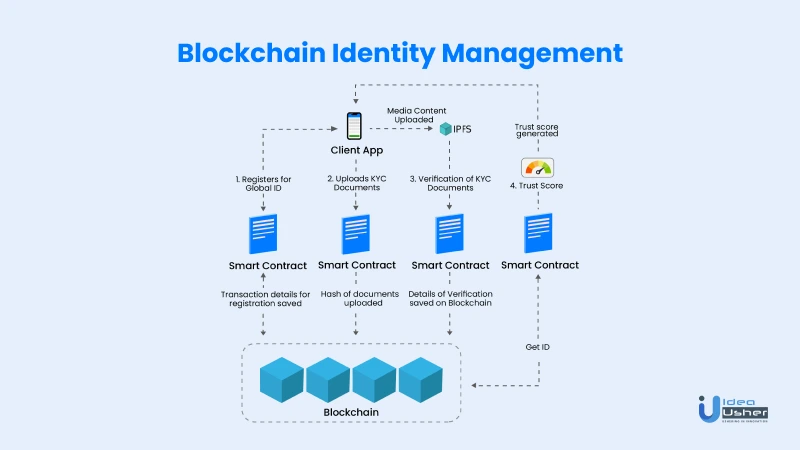
“How can blockchain improve business?”
“Which industries can benefit from blockchain?”
If you’re someone who is constantly looking for answers to these questions, you’ve landed at the right place.
Blockchain, as we all know, is a technology that creates an immutable, decentralized ledger of transactions. Incorporating this technology into the businesses can be tricky, and that’s where a lot of entrepreneurs find trouble.
Well, not anymore, because in this article, Idea Usher experts lay down the critical benefits of blockchain that help businesses in several industries improve and grow. We’ll also discuss how you can integrate blockchain into your operations. So, without further ado, let’s dive right into the blog.
A quick glimpse of the blockchain industry
The global blockchain market was valued at USD 1.57 billion in 2018 and is expected to reach USD 162.84 billion by 2027.
Statista
| Number of users (2021) | 68.42 million |
| Popular blockchain platforms | Ethereum, Ripple, Hyperledger, Solana, Tezos |
| Key features | Decentralized, Immutable, Secure, Consensus |
| Pros | Accuracy, Cost reduction, Transparency, Tamper-proof |
| Cons | Technology cost, low transactions per second, Data storage limitations |
Challenges that blockchain can help overcome
Here are a few challenges faced by the traditional businesses that blockchain can help to solve:
1. Transaction speed
The traditional functioning methods rely upon a central authority to conduct and manage transactions. These transactions can take a few days to settle and reflect in the accounts. Moreover, financial institutions operate during fixed business hours and working days, whereas blockchain functions round the clock. It can execute and settle transactions in just a few hours. That said, some transactions may even take a few seconds to process.
In addition to transactions, blockchain helps speed up other business processes to improve efficiency. It removes intermediaries, reduces the chances of human-based errors, and helps to automate the processes.
For instance, Walmart had a process that took seven days to trace the source of sliced mangoes. But, since it switched to blockchain technology, the processing time has reduced to seconds.
2. High fees
Traditionally, you must pay a specific fee for almost every activity, be it transaction verification charges, notary charges, or other related charges. You must note that these transactions are related to third-party verification. Blockchain eliminates the need for third-party verification and, thus, its related costs.
For instance, banks and other financial institutions charge a transaction fee from customers when they accept payments using credit cards. On the other hand, Bitcoin does not have a central authority and has a relatively lower transaction fee.
Moreover, blockchain also reduces process costs by streamlining and automating business processes.
3. Fraud risk
Traditional businesses have a constant risk of fraud that they can reduce by integrating blockchain into their functions. The three main characteristics of blockchain that help prevent fraud are:
| Blockchain is distributed | The blockchain is a distributed ledger containing data shared across a network of computers. There is no central authority; thus no single point of failure. A shared ledger increases visibility and transparency, making fraudulent activities easier to identify. |
| Blockchain is immutable | The transactions stored on the blockchain are immutable, meaning they cannot be changed once recorded. This immutability helps to reduce the instances of counterfeit goods sold. The traditional supply chain is long and complex; thus, the chances of fake goods sold are higher than on blockchain. |
| Blockchain can be permissioned | Businesses have a lot of confidential data that cannot be shared with everyone. Thus, it becomes essential to issue permissions to prevent outsiders from accessing the information and insiders from tampering with the same. However, you must note that not all blockchains are permissioned. |
4. Security
Security is one of the most critical issues that conventional businesses face. Blockchain provides greater security to the businesses.The blockchain network must verify a transaction’s authenticity once it is recorded. Many computers on the blockchain scramble to confirm that the transaction’s data are accurate. The transaction is added to the blockchain block once a computer has verified it.
On the blockchain, each block has its own hash and the distinct hash of the block that came before it. The hash code of a block changes whenever the information on that block is altered, while the hash code of the block that comes after it does not. This mismatch makes it very challenging to modify data on the blockchain without notice, and this process ensures greater security on the blockchain.
Is blockchain worth using? YES!
We’ve discussed the problems that traditional businesses face and how blockchain can help overcome those challenges. But is this technology worth investing in? Why should entrepreneurs use blockchain? What are its benefits? Let’s find out.
1. Increases transparency and trust between parties
As stated earlier, blockchain is decentralized in nature. Thus, you can view all transactions transparently by having a personal node or using blockchain explorers that allow you to view transactions live. Each node has its chain copy that updates when new blocks are added.
However, it is essential to note that the records stored in the blockchain are encrypted, which means blockchains can remain anonymous without losing transparency. This transparency and privacy also ensure that your data is safe and shared only with the members you grant access to, leading to greater trust.
2. Makes it easier to verify transactions
Blockchain functions on a peer-to-peer network, and all the members have access to a node. No intermediaries are involved in the transactions, and the verification becomes more straightforward and quicker. Blockchain follows a consensus mechanism in which most nodes (computers) must agree to the validity of the transactions. Thus, the members themselves verify the transactions on the blockchain.
3. Reduces the counterparty risk of a transaction
Counterparty risk is the possibility of the other party defaulting on their obligations in a transaction. Blockchain significantly reduces counterparty risk by employing smart contracts.
Counterparties agree to fund a margin amount dependent on the magnitude of the possible transaction when they enter the smart contract. The margin is deposited into each counterparty’s personal account and cannot be disbursed before the preceding settlement or after the margin check. The contract is valued and can move to settlement after the margin examination to ensure it complies with the contract’s requirements before a new cycle starts. The agreement terminates if the parties do not pay the margin within the acceptable window or if it is insufficient to cover the payment.
4. Can be used to transfer any asset across the globe instantly and securely
Blockchain and cryptocurrency allow users to make fast and cheaper international transfers due to their connection with internet production capacity. Community members trade cryptocurrencies with their international counterparts on online trading platforms instead of being constrained by conventional banking systems.
Every day, developers create decentralized entities to aid in the transition to a worldwide asset transfer system. One example is KwikTrust, which aims to become the global norm for controlling and transferring assets in the digital age.
Ways in which blockchain can improve business
Blockchain has several use cases and applications in business operations. But how can blockchain improve business? Let’s discuss.
1. Use smart contracts
Smart contracts are self-executing contracts where both parties write their terms and conditions in the form of codes. Later, decentralized blockchain networks store these codes to make them immutable. A smart contract automatically executes the agreement terms when the written codes are fulfilled. If any party defaults or overrules a condition, the products are returned to the other party.
Thus, blockchain and smart contracts allow businesses to create legally binding agreements without a central authority.
2. Better recruitment
Many candidates who apply for a job position create their resumes by merely editing readymade templates. They also often make an impression of being better than they are and having done things they haven’t done. They do this because of the assumption that recruiters do not have time to verify and cross-check the factual accuracy of their qualifications and do a background check. It is true in the case of traditional recruitment processes.
However, blockchain can assist businesses in speeding up the hiring process by providing access to easily verifiable candidate records at their fingertips. Recruiters can quickly verify the authenticity of the candidate’s qualifications by going through the academic records, extra-curricular activities, and past employment records stored on the blockchain.
3. Raising capital
Blockchain provides companies with an alternative capital-raising method called Initial Token Offering (ITO). ITOs are similar to Initial Public Offerings (IPOs) in the case of traditional companies. Investors participating in the sale will receive new blockchain-based tokens from the company. This token may have some utility in using the company’s product or service or simply represent a stake in the company or project. Because of their growing popularity, ITOs have emerged as a viable capital-raising option for businesses of all sizes.
4. Know the customers better
Blockchain facilitates better identity management (more on that later). Customers have digital IDs stored on the blockchain, which helps businesses quickly verify their identity. Blockchain also helps to reduce the risk of identity theft, fraud, money laundering, and other security concerns.
Further, blockchain ensures transparency, allowing businesses to see how their relationships with their customers have developed over the years. It also assists in analyzing the customers’ spending patterns, helping you reach an appropriate target audience.
5. Improve marketing campaigns
Effective marketing strategies are crucial for any business to grow and expand. Although we have traditional marketing modes like social media, outdoor advertising, print advertising, and more, they have their limitations. Marketers can use blockchain to track client information and customer behavior and then utilize this data to craft clever marketing strategies that drive greater returns. Blockchain can also help them identify changes, trace mistakes, and verify whether traffic comes from real people.
6. Supply chain management
Supply chains are a company’s logistical system through which it transports goods from the point of origin to the end user. Most of these systems contain independent databases where records are kept centrally, which makes acquiring verifiable information about shipments and processes nearly impossible.
Blockchain can solve this problem by allowing the parties on a supply chain to log information once they have proper permissions. It also provides a single secure system by which each unit in the supply chain can view how the goods are being handled and processed on their way to the final destination. Thus, this system increases transparency and accountability if lost, damaged, or fake goods enter the supply.
Industries that can benefit from blockchain
We have found the answer to the question, “How can blockchain improve business?” but we still have another question to answer. “Which industries can benefit from blockchain?”.
Below are a few industries that can use blockchain to their best advantage:
1. Identity management
Blockchain will play a critical role in identity management, allowing users to take ownership of their identity by creating a global ID serving multiple purposes. It also provides security as no third party can access a user’s personally identifiable information (PII) without their consent.
Some other benefits of blockchain identity management include:
- No paper-based identity management
- Self-sovereign identity (SSI)
- Easier identity verification
- User identity management for IoT systems
- Identity management for the decentralized web
- Non-custodial login solutions

2. Media
We live in a digital world where much money is made through media production and distribution, content ownership, and licensing. Blockchain technology can alter the rights and ownership of media assets (audio or video). Many media companies have already started adopting blockchain to reduce fraud, cut costs, and protect content’s intellectual property rights (IPR).
Blockchain in the media and entertainment market will be worth USD 11.8 billion by 2030.
Market Research Future
3. SaaS companies
Blockchain technology is ideal for SAAS companies with long-term income that require credit lines. Historically, this procedure has been complex and takes far too long for entrepreneurs to cover gaps in their company revenue. A founder can use smart contracts to safely submit their annual recurring revenue and acquire a credit line in less than five minutes.
4. Real estate
Real estate can profit significantly from blockchain as a typically conservative business with significant entry barriers. In recent years, blockchain has been used to eliminate industry mediators like agents, brokers, property managers, lenders, and others, boosting transparency and accountability while offering direct access to more minor participants such as homeowners and investors.
5. Healthcare
Blockchain in healthcare is an emerging concept that would help gain end-to-end knowledge of clinical information and the expense at the patient level. Blockchain can connect specialized devices with the patient’s health records to facilitate better analysis.
Some benefits of blockchain in healthcare include:
- Research help
- Easy access to patients records
- Improved accuracy
- Securing patients’ data
- Tracing medical supplies
- Verifying health insurance
- Disease tracking
- Protecting genomic data

How to integrate blockchain into your business?
By now, we know the benefits of blockchain and how it can improve businesses, but it is also crucial to understand how companies can integrate blockchain into their functioning.
Here are the steps that businesses need to follow for blockchain integration:
| Steps | Description |
| 1. Set the objective | Determine your business goal, and understand why you wish to integrate blockchain into your business. |
| 2. Outline the benefits | Lay down the benefits that you’ll get by integrating blockchain into your business. Analyze if it is worth focusing on the integration. |
| 3. Develop a structure | You need to have these things ready: consensus rules, data privacy for ledger users, a set of algorithms to run. |
| 4. Create a roadmap | Outline how you are going to implement the integration. Describe MVP, FFP, platform specifications, designs, etc. |
| 5. Choose a blockchain platform | Next, you need to choose which blockchain platform you would like to go ahead with. You can choose from a host of options available, depending on your needs and wants. |
| 6. Implement the concept | Now comes the actual implementation of the task. You need to carefully go through your requirements and implement your concept accordingly. |
Following these steps can be overwhelming for a lot of people. It is advisable to consult experts or partner with a reputed blockchain development company that can help you integrate blockchain into your business smoothly.
Idea Usher is a technology company with expertise in blockchain development and other related services. Our blockchain experts rely on the latest tools and resources to deliver top-notch blockchain solutions to clients. Providing timely, affordable, and scalable digital services is our greatest strength.
Contact us to integrate blockchain into your business and push it a level higher.
E-mail: [email protected]
Phone Numbers : (+91) 946 340 7140, (+91) 859 140 7140 and (+1) 732 962 4560
Conclusion
Time and again, blockchain has proved its worth by disrupting conventional business functions and operations. It has created a market for itself in almost every sector, be it gaming, health, finance, or real estate. Its increased adoption by several businesses is evidence of its massive success.
The benefits and applications of blockchain discussed in this article are merely the tip of the iceberg. This technology has countless other use cases to help businesses improve their operations and increase profits.
Frequently asked questions
Here are a few exciting FAQs about blockchain and its application in business.
1. Why is blockchain important for business?
Blockchain is essential for business as it provides several advantages such as transparency, speed, security, accuracy, etc.
2. What problems does blockchain solve?
Blockchain helps to solve various problems related to data storage, supply chain, recruitment, identity verification, capital generation, etc.
3. What is the main purpose of blockchain?
The primary purpose of blockchain is to provide a shared, distributed, and decentralized ledger that allows one to record and store information but not edit the same without consensus.









Bristin Borah